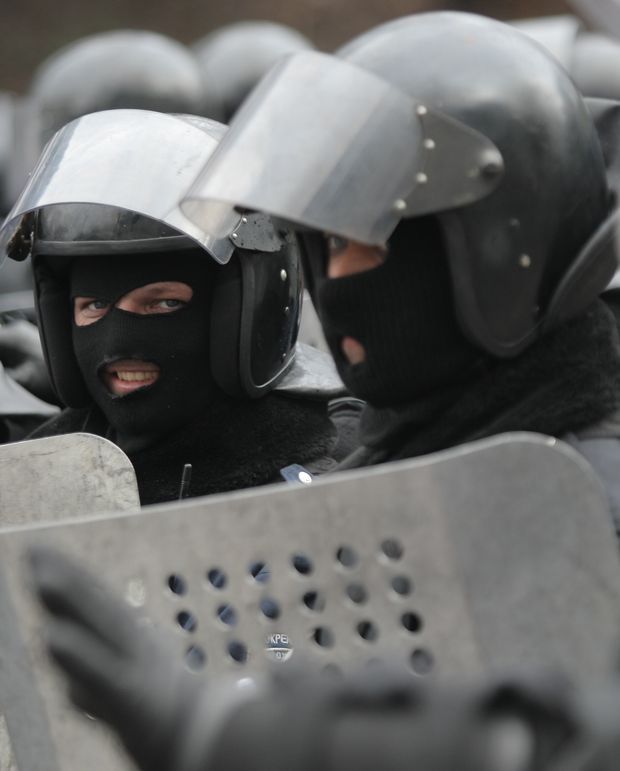On the totalitarian syndrome
“Law-enforcement structures, secret police, and the army should not take on individuals with high aggression levels,” says social psychologist Olena LISHCHYNSKA
The antagonism in the center of Kyiv, which lasts more than 90 days now, leaves no one indifferent. People are dying on either side of the barricades, with most deaths in the protest camp. It was a shock: snipers killed dozens protesters, leaving many more wounded. The cruelty, with which civilians are killed, is horrifying. In their turn, the protesters try to reply in kind, hurling Molotov cocktails and stones and burning tires. Why all this aggression in a peaceful people, which we Ukrainians were believed to be until now? We asked Professor Olena LISHCHYNSKA, Doctor of Psychology.
“People participating in this sort of warfare are half-conscious. The causes vary from individual to individual. This is war, therefore we should be talking about the psychology of an individual on the front line. People find themselves on the front line for two reasons: either they go there voluntarily, or they are forced. A volunteer is aware of what is going on around him or her. Those who are forced can experience an inner discord and wind themselves up with some ideas. No one can show aggression in person-to-person relations, this is only possible in the subject-to-object model. This is known as ego-defense mechanisms of human psyche. As far as the current developments go, we see no common aggression. The aggression of someone who just now lost a friend, and the aggression of a thug lie worlds apart. This is a word with many meanings.
“Aggressiveness as a personal quality is imminent in a human being during all his life. This quality is not acquired overnight, it is rather an emotional response to stress and extreme situations. When politicians call to stop aggression, it is a good and right thing to do, but in political terms aggression is stopped with a command, an order, a retreat on both sides. I cannot see any abnormal aggression now, Ukrainians are not mad. The ongoing protest is taking its regular course, in terms of mass behavior.”
What surprised social psychologists in the behavior of both fighting parties? Which aspects of the society’s behavior turned out unexpected?
“I did not expect torture in Ukraine. There is such a thing as professional unsuitability. Astonishingly, so many trained professionals, who should be tested for occupational suitability, turned out to be completely incompetent. Which raises doubts as to the selection procedures for the jobs in law-enforcement and paramilitary structures. I used to work together with police psychologists. When asked about the essence of their work, they said that their first and foremost task was to subject candidates to occupational suitability test. A candidate must be healthy, have certain personal features, and most zimportantly, they must not be hyper-aggressive. Now we observe an absolutely different picture.”
Do you agree that the cruelty of the police and paramilitary is enhanced by material incentives, such as higher salaries, guaranteed welfare, and housing?
“They are there for money, indeed, that is part of the job. There is such a thing as professional snobbism: each professional group has a feeling of its own exclusiveness. These professional groups undergo a certain ideological brainwashing. Very helpful here are American action films. They are focused on young people, who yearn to feel cool heroes. But if they get this for granted and free of charge, and when they do not have to prove it with action, men in uniform have no choice left: they must make use of it all. They are in their own environment, they are not accountable to anyone, and the common sentiment spreads. The syndrome of totalitarian personality forms if an individual receives numerous opportunities for action, with the commander bearing the brunt of responsibility. With plenty of opportunity to exercise the superpower and moral responsibilities it is hard to refrain from criminal actions.”
After the Second World War American psychologist Stanley Milgram carried out an experiment to prove that a part of society is subconsciously prepared to submit to authority, even if it involved physical suffering. Does this experiment relate to today’s reality?
“Our situation does. Milgram proved that an average person is willing to submit to an authority figure, provided someone else assumes the responsibility for the others’ eventual physical suffering involved. In the army, police, and paramilitary great importance is attached to fostering obedience to the commander, who assumes responsibility for any actions. These are closed communities, where individuals affect each other, ‘contaminating’ each other with emotions and ideas and, most importantly, the treatment of others is devoid of any humanity. The assumption is that the opponents have no human features, they are losers, extremists, ‘Maidan geeks,’ so they are treated with contempt and their rights are infringed. If a couple of ideological sociopaths create a group and imbue it with their ideas, even a sound person assimilates to them after contacting with them for some time. The existing situation is not surprising: if people are isolated, figuratively speaking, in a boiler without any influx of oxygen, it will inevitably result in an explosion, which we are witnessing today.”






